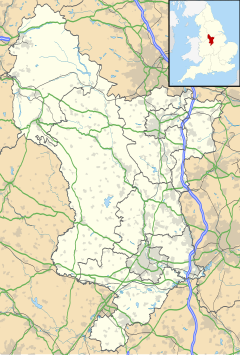This article needs additional citations for verification. (December 2020) |
Dronfield Woodhouse is a district of Dronfield, in the North East Derbyshire district, in the county of Derbyshire, England.[1] The area has been inhabited since at least the 11th century (Cowley – pronounced Coaley – Farm, to the south) and its main road, Carr Lane, features a 13th-century house, formerly Hall Farm. The 19th-century former primary school on Holmesfield Road is now an elderly care home.
| Dronfield Woodhouse | |
|---|---|
 Pentland Road shops, Gosforth Valley, Dronfield Woodhouse | |
Location within Derbyshire | |
| OS grid reference | SK332786 |
| Civil parish | |
| District | |
| Shire county | |
| Region | |
| Country | England |
| Sovereign state | United Kingdom |
| Post town | DRONFIELD |
| Postcode district | S18 |
| Dialling code | 01246 |
| Police | Derbyshire |
| Fire | Derbyshire |
| Ambulance | East Midlands |
| UK Parliament | |
Coal mining was an important activity in the village in the 19th and early 20th centuries and the last pit to close was Hurst Hollow in 1947. The current public house, the Miners' Arms, stands opposite the entrance to one of the former mines. Along with mining went Methodism. The chapel, built in 1848, has recently been converted into a dwelling following its closure. In the immediate post-war period the village had its own post office and general store opposite Hall Farm and there were also two other village shops in Carr Lane. The building of a number of council houses in the 1950s linked Dronfield Woodhouse to the hamlet of Stubley, which in its turn had already been joined to Dronfield in the period between the two world wars. In the 1960s a large housing development took place in the adjacent Gosforth Valley turning Dronfield Woodhouse into a quiet dormitory settlement for nearby Sheffield and Chesterfield. The surrounding countryside is still readily accessible, however, and the boundary of the Peak District National Park is less than 2 miles to the west.[1]
On 31 December 1894 Dronfield Woodhouse became a separate civil parish, being formed from Dronfield, on 1 April 1935 the parish was abolished and merged with Dronfield.[2] In 1931 the parish had a population of 976.[3]
References
edit- ^ a b Ordnance Survey: Landranger map sheet 119 Buxton & Matlock (Chesterfield, Bakewell & Dove Dale) (Map). Ordnance Survey. 2012. ISBN 9780319231890.
- ^ "Relationships and changes Dronfield Woodhouse CP through time". A Vision of Britain through Time. Retrieved 24 April 2024.
- ^ "Population statistics Dronfield Woodhouse CP through time". A Vision of Britain through Time. Retrieved 24 April 2024.
